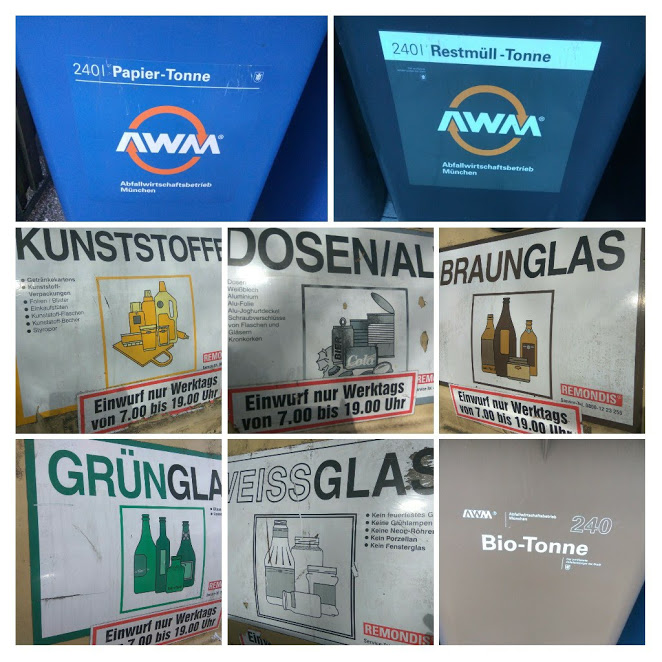When I offered to throw the house trash, my sister-in-law handed me 6 different trash bags. 6! Yes, 6! (To all the people reading this blog who are unaware of how particular Germans are about segregation of their trash, I am not joking!) I had never seen such a thorough segregation of trash in my entire life either! They were, namely:
- Paper
- Bio waste
- Plastic
- Glass
- Tin
- Others (which didn’t fit into either category)
And if I already thought it was pretty crazy, I was about to get another shock. When I reached the place where different trash cans were, I realized that there were 3 different trash bins for glass and would have done a major facepalm if I wasn’t carrying so many trash bags in my hands. One needed to segregate glass further into 3 parts based on the colour of the glass bottles/jars:
- Green glass
- Brown or other dark coloured glass
- White/ transparent glass
Such meticulous segregation of garbage was unprecedented for me! In India, we just put everything in one dustbin. Only a handful of my friends (so few that I can count them on the finger of one hand) segregate waste bio-waste for composting. Our sense of recycling is different. A lot of households, especially the middle class, recycle glass bottles and plastic containers by washing them and reusing them at home for storing condiments, spices, different meals, lentils, beans, etc. Or usually, people home call a “trash-man” or “kabadiwala” as we refer to it in Hindi, and “sell” their trash (mainly glass, paper, tins, cardboards, electronics) to him. Yes, dear Germans, we Indians actually get paid to sell our trash! For example, glass is priced at 10 cents a kg and paper at 12 cents a kg! There is also a price difference between the Hindi newspaper trash and the English newspaper trash, the English ones priced higher than the Hindi ones as apparently, the quality is better! I recently sold a dead (completely non-functional) laptop for 13 Euros.
In fact, the only place where I have seen segregation of trash in India is in hospitals and that is simply because one needs to categorize radioactive therapy wastes, or as per the legal occupational safety norms, one needs to wear protective gear before handling certain kinds of garbage that may have fatal viruses or germs on them. Even though the city I come from- Jamshedpur- the Tata group (which founded the city) is also quite particular about waste management. We have roads being built out of plastic waste and plants to recycle all the sewage water and human waste. The Tata group aims to make Jamshedpur a zero waste city. But again, that’s just at the city infrastructure level- not so much at individual level.
With every citizen being so painstakingly careful about segregation of waste, it’s not a wonder that Germany tops the world in trash management with more than 80% of waste in Germany being recycled! That’s simply WOW and deserves a fist bump, Germans!

